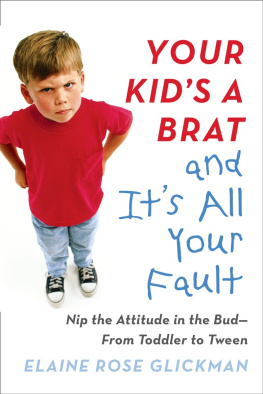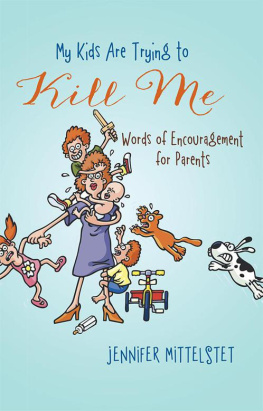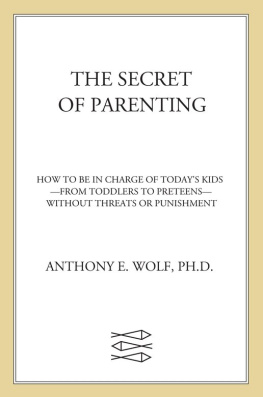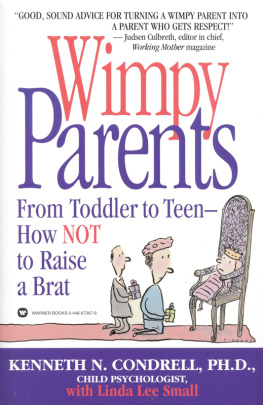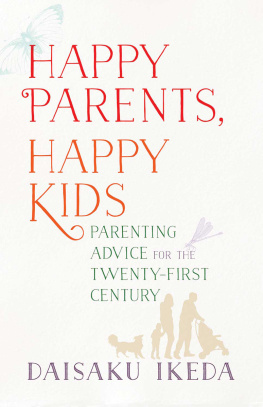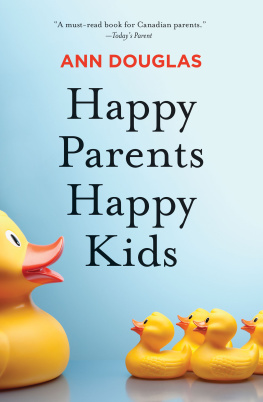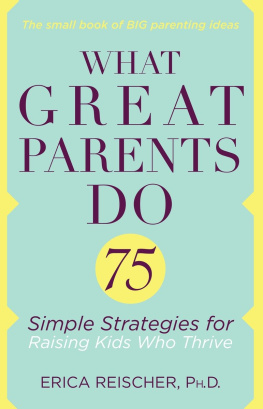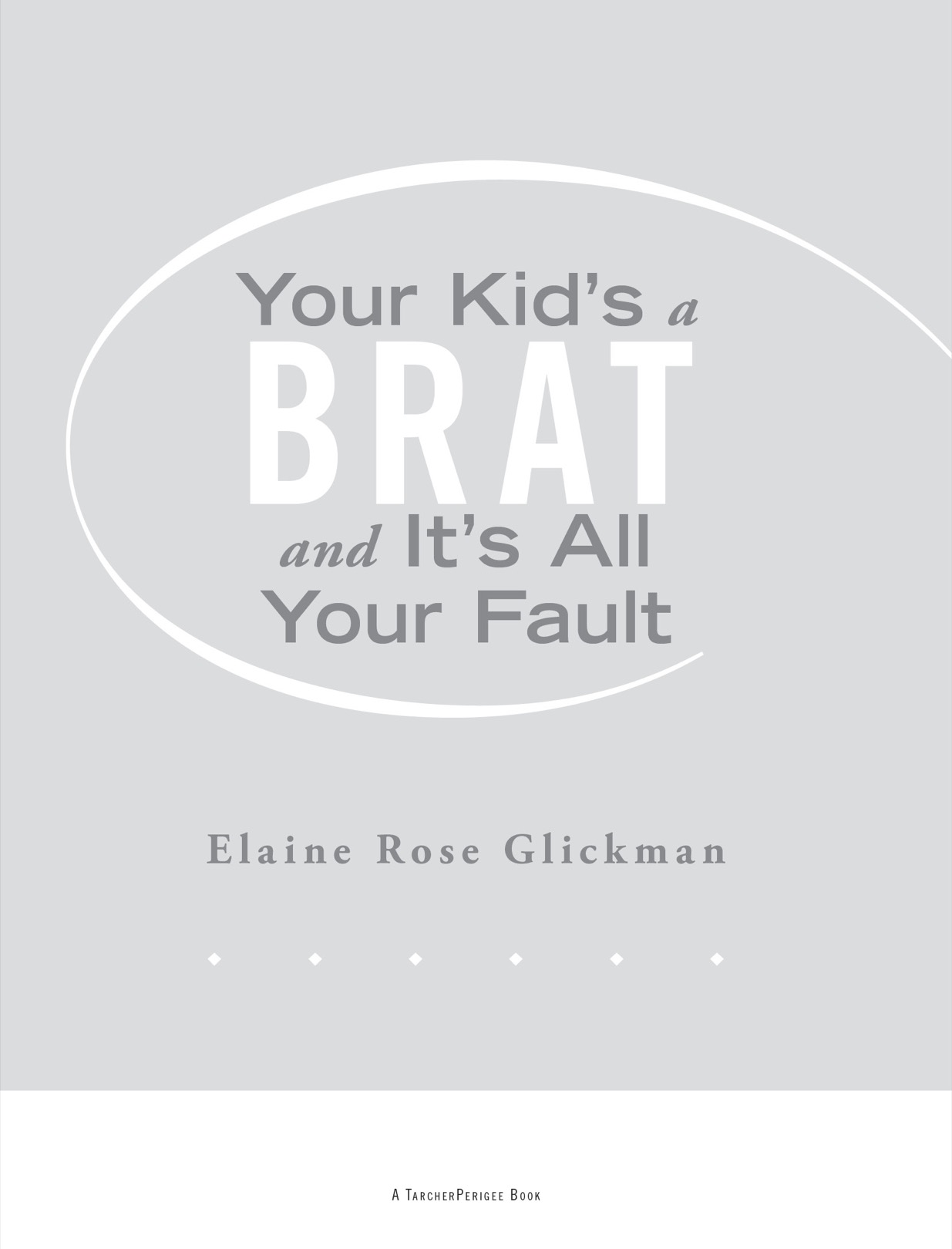Penguin supports copyright. Copyright fuels creativity, encourages diverse voices, promotes free speech, and creates a vibrant culture. Thank you for buying an authorized edition of this book and for complying with copyright laws by not reproducing, scanning, or distributing any part of it in any form without permission. You are supporting writers and allowing Penguin to continue to publish books for every reader.
Tarcher and Perigee are registered trademarks, and the colophon is a trademark of Penguin Random House LLC.
Most TarcherPerigee books are available at special quantity discounts for bulk purchase for sales promotions, premiums, fund-raising, and educational needs. Special books or book excerpts also can be created to fit specific needs. For details, write: SpecialMarkets@penguinrandomhouse.com.
Names: Glickman, Elaine Rose, author.
Title: Your kid's a brat and it's all your fault : nip the attitude in the budfrom toddler to tween / Elaine Rose Glickman.
Description: New York : Tarcher, 2016.
Subjects: LCSH: Parenting. | Parent and child. | Pampered child syndrome. | Problem childrenBehavior modification. | BISAC: FAMILY & RELATIONSHIPS / Parenting / General. | FAMILY & RELATIONSHIPS / Life Stages / School Age.
Some names and identifying characteristics have been changed to protect the privacy of the individuals involved.
INTRODUCTION: YOUR KIDS A BRAT
Weve heard themkids ordering their parents to shut up. Weve seen themkids pushing past grown-ups into the elevator. Weve met themkids who whine and bite and never say thank you and have better phones than we do.
Maybe some of these kids are even our own.
We know their other sides, of course. These kids are also smart and sweet and funny and capable and affectionate. They get stressed out at school; theyre influenced by the media and advertisements and (less worthy) friends; theyve endured countless phases and growth spurts and challenges. Theyre living in a culture that glorifies violence, sexualizes children, and encourages kids not to be kind or responsible or mature but to be coolto mouth off to grown-ups and acquire expensive stuff and look hot and generally act like sort of a jerk.
We know our smallest kids are affected, too. They learn bad manners when they hear adults speaking rudely to one another. They learn that appearances matter when beaming strangers proclaim them beautiful. They learn to prefer unhealthy meals when they see PBS Kids shilling for Chuck E. Cheeses.
We know that society is doing an excellent job turning our wonderful children into inconsiderate, demanding, materialistic, self-centered, disrespectful, junk-food-craving brats.
The problem is that sometimes we do the same.
Our intentions are good. We want our kids to be happy, so we hesitate to tell them no. We want our kids to express their opinions, so we let them talk back. We want our kids to be well fed and well rested, so we overlook misbehaviors during dinner and at bedtime. We want our kids to feel important, so we let them call the shots.
But one day we turn around and realize that weve got on our hands indulged, disagreeable children who are rarely told no and eat only five foods. And as wonderful as these children may nevertheless appear to us, we must admit that in many parts of the universe they would be called brats.
And that is the ultimate irony. In our quest to give our children the bestto provide every comfort, every advantage, every peak experience, every drop of self-esteemwe are actually failing them pretty badly.
No one likes a brat. Not teachers, not coaches, not babysitters, not other parents. And certainly not the adults who will someday be interviewing our children for admission to a prestigious college or evaluating their prospective value as an employee or considering becoming their spouse.
If we truly want our kids to be happy and cherished and successful, we have to teach them, well, not to be a brat. For our sake and the sake of those around us, yes. But also for their own.
Because its not only those around our kids who would strongly prefer they not be brats. Its also our kids themselves.
A toddler shrieking in the checkout line may appear to want a Push Pop. A third grader rolling his eyes may appear to want a more accommodating parent. A tween demanding to wear a skirt so short you can see her thong underwear may appear to want popularity and male attention. But what they really want are limits and boundaries and consistent expectations. What they want are opportunities to learn discipline, to demonstrate responsibility, to develop self-esteem, to earn self-respect and the respect of those around them. What they want, deep down, is for ustheir parentsto step up. To say, no, stop it, thats not okay. To say, you dont need to act like a brat to get my attention or to get what you want. To say, I love you enough to teach you a better way.
In the short term, the brat with the cowed parents may seem to have it pretty good. But in the long term, thats not who we want our kids to be. In the long term, thats not who they want to be, either.
So how do we stop our kids from becomingor continuing to act likebrats? This book will help us learn how to recognize situations in which we are enablingor even encouragingbratty behavior; how to see our children, and our parenting, as others do; how to change unhealthy patterns and make things betterfor our kids, for those around them, for our families, for ourselves; and how to step up and be the parents our kids deserve.
Even if those kids are, at the moment, stretched out on the couch, feet propped on the coffee table, hollering for a soda. Go ahead and pour them a drink (dont forget the crushed ice!)but you might want to warn them its last call. Things are about to change.
SECTION
Your Budding BRATToddlers and Preschoolers
INTRODUCING YOUR BUDDING BRAT
Of course your kid is the most precious creature in the universe, and of course you love her with every ounce of your being, and of course you revel in every amazing thing she does, especially those amazing things her peers are not yet doing, probably because they eat so many processed foods. But...
But have you noticed that your kid is developing a couple of habits that are a tad less than delightful? Maybe telling you what to do, like, a lot; maybe kicking you if you dare to disobey; maybe emitting loud and unrelenting shrieks at bedtime or in the checkout line or at a restaurant (or all of the above, hooray!). And not that you have any ambivalence about your kids wonderfulness, because she is totally special and extraordinarybut if you were to be one hundred percent honest, you might admit that, well, these habits are a teeny bit annoying. And that you and she might be a lot happier if she would cut it out.

